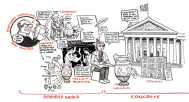Which side of the corporate corpus callosum are you on?
 Ian McGilchrist gave a nice lecture, animated by RSA Animate about the “Divided Brain” – and how it created Western society. The mediating/inhibiting influence of the corpus collsum between the two brain hemispheres has become weakened, allowing the logical, linear left to dominate over the sensory, panoramic nature of the right.
Ian McGilchrist gave a nice lecture, animated by RSA Animate about the “Divided Brain” – and how it created Western society. The mediating/inhibiting influence of the corpus collsum between the two brain hemispheres has become weakened, allowing the logical, linear left to dominate over the sensory, panoramic nature of the right.

The high tech culture of programmers has become, in my mind, the epitome of society’s left brain, and it is ghettoizing the right brain.
Let me toss out an idea: Programming skill shouldn’t be based on how good one is at manipulating numbers. Programming skill should primarily be about finding (and making) patterns, seeing connections, and using metaphors.
Computers are famously good with numbers, memory, and repetition, so why should programmers have to be good at these things too? Originally, when the computer age was young, programmers had to be sort of computer-like, just in order to build the damn things. I would contend that the culture really needs to change now that software runs so much of our lives. Programmers should be spending more time engaging in meta-math: creative pattern-finding, and building tools that match our human-like thinking; the thinking that comes from brains evolved to hunt, gather, play, explore, and build.
Our lives are increasingly dependent on software. I believe the wrong people are writing the software that runs our lives. The priests of high tech are extremely good at linear thinking (and often also at manipulating money and laws). Programmers are generally good at computation, and holding many levels of complex logic in their heads. These people have a high tolerance for software complexity.
No wonder software is so hard to use.
Hunter-gatherer skills deal with a different kind of complexity – the kind of complexity that characterizes the nonlinear world we live in. It requires all of our senses: sight, sound, touch, smell, balance…all merged unconsciously to form intuition. This intuition gathers environmental clues and builds context. These skills are ignored in most of our interactions with software. We are required to remember volumes of passwords and navigate geeky user interfaces with poor affordances. Many of these interfaces change every few months.
There is an under-appreciated range of people working on the periphery of the high-tech software industry. They know that there is a problem; they know they can help make it better. But they are on the wrong side of the corporate corpus callosum. They are in the ghetto. In order to make the situation better, they need to be empowered. They need to be on the inside.
Being dyslexic, poor at math, slow at solving puzzles, distracted, and easily frustrated with nonintuitive tools should not keep people from participating in the software development process. In fact, I think these are the very people who are most needed. These are the people who will make software interfaces resonate with humanity at large.

